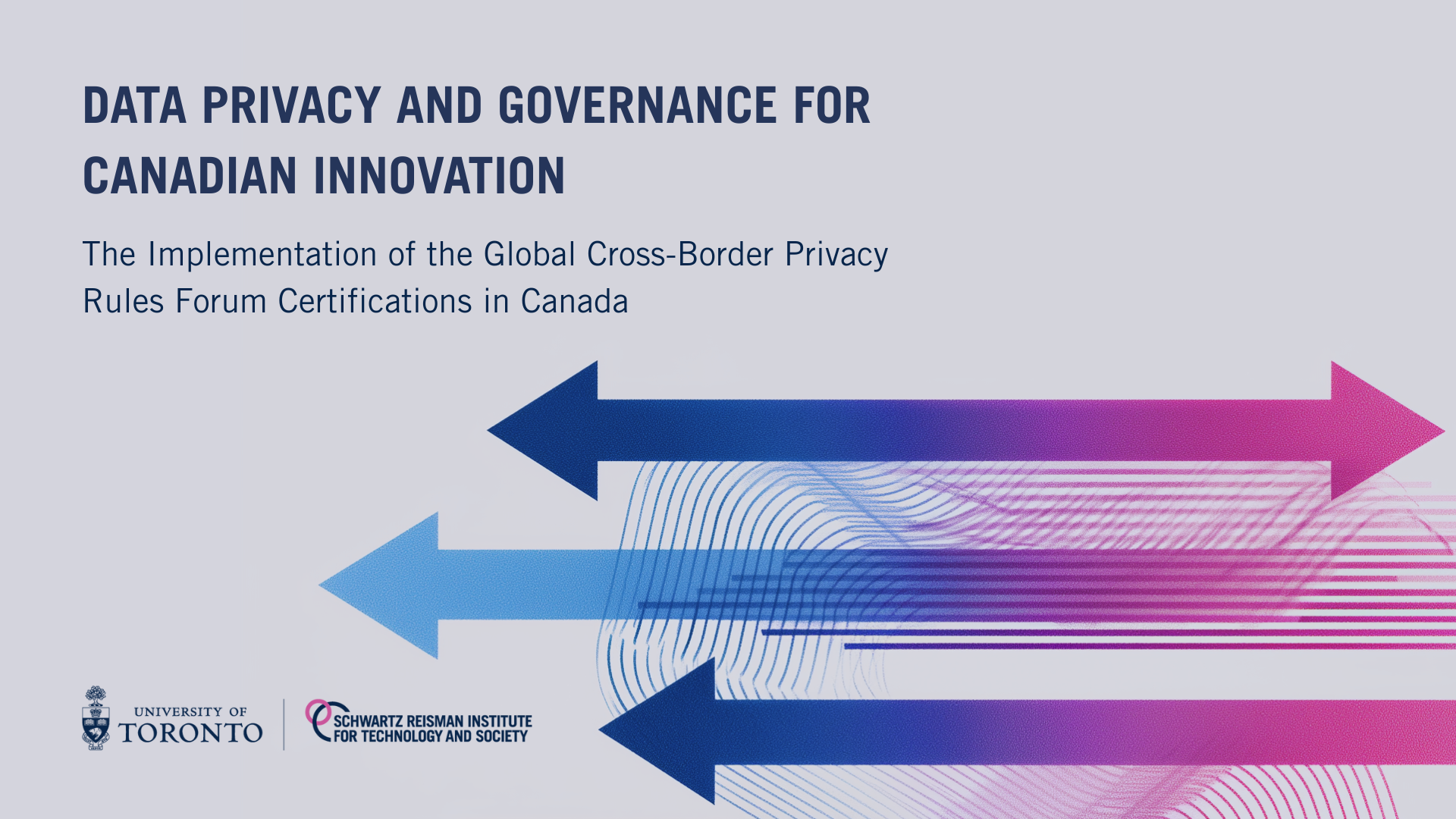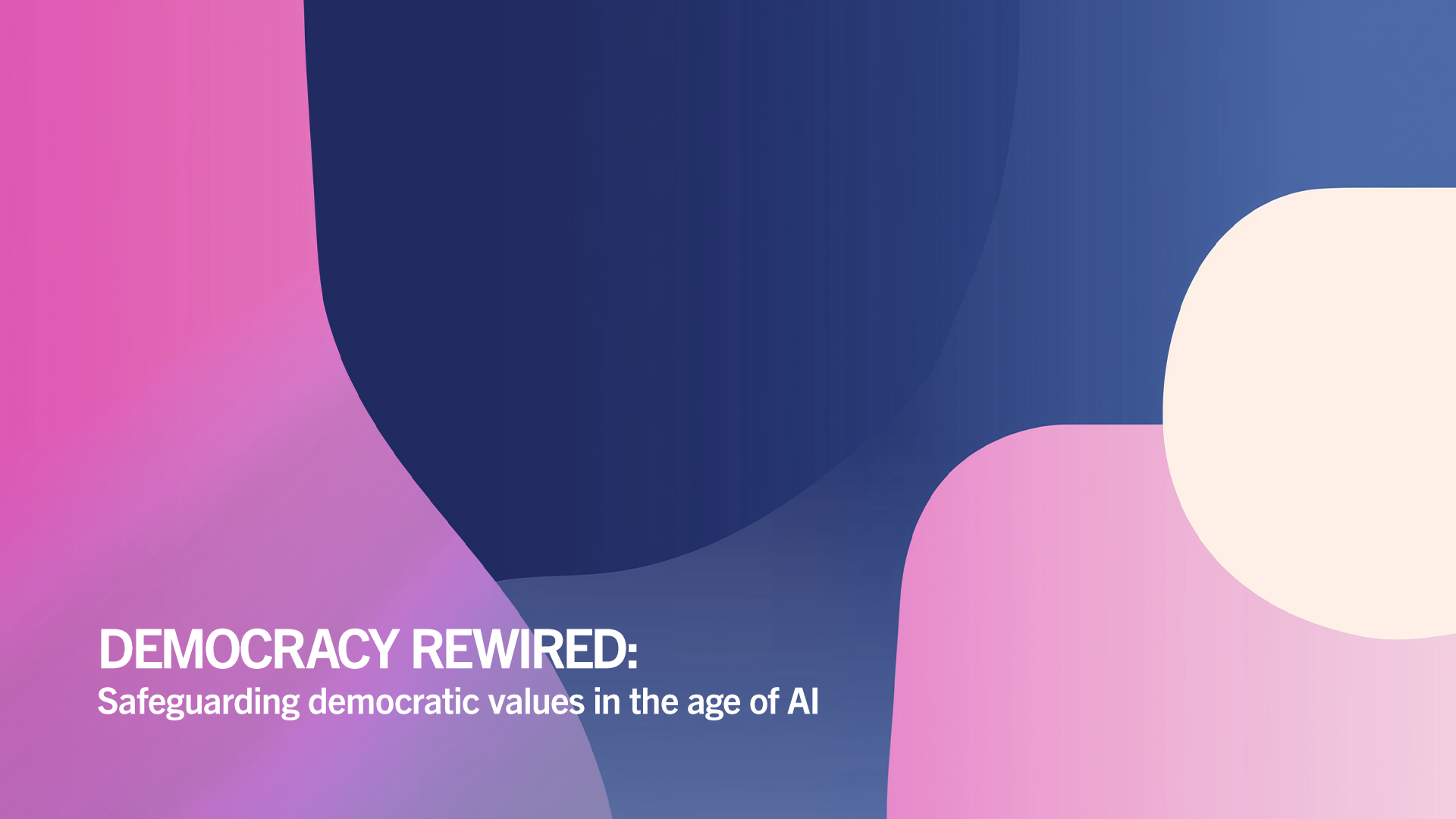Discerning signal from noise: New SRI report explores insights from the state of global AI standardization
In a new report published by the Standards Council of Canada, the Schwartz Reisman Institute for Technology and Society surveyed the global landscape of AI standards to identify key areas to leverage standards as an AI assurance tool. The report provides a valuable snapshot of current AI regulation and emphasizes the need to ensure safe and responsible AI development as Canada continues to invest in AI.
Recent advances in artificial intelligence (AI) are reshaping many vital sectors across society today, and generating a wave of innovation and excitement. In fields such as healthcare, finance, and education, AI systems are enabling more accurate and efficient predictions in medical diagnoses, increasing strategic insights for more efficient economic regulation, and providing personalized assistive devices and content for enhanced learning outcomes.
Yet, amidst the many promising potentials of AI technologies, it is vital to also understand and mitigate against potential risks that are posed by these new systems. As Canada continues to invest in the adoption of data-driven technologies across society, the safe and responsible use of AI must remain top of mind. And, while AI systems pose some unique challenges, regulators are not without the tools and frameworks needed to put assurance frameworks in place.
A new report from the Schwartz Reisman Institute for Technology and Society (SRI), published today by the Standards Council of Canada, examines how standards are an essential tool to ensure the safe and responsible use of AI, and provides insights and strategies towards the creation of forward-thinking guidelines to support the development of responsible AI practices without stifling technological innovation. The new report also provides a valuable snapshot of the current landscape of AI regulation, both in Canada and internationally, and identifies opportunities for Canada to leverage standardization, both at home and abroad.
“Discerning signal from noise: The state of global AI standardization and what it means for Canada” (2023) explores key takeaways from the global landscape of AI regulation.
Key opportunities to leverage standardization for AI regulation
The Standards Council of Canada (SCC) promotes voluntary standardization efforts in Canada by driving the creation of forward-thinking standards, conformity assessments, and accreditation programs that reflect and advance Canadian values. Standardization is a vital tool used across sectors to mitigate against potential harms by providing expectations about the quality and safety of new products, systems, and services.
Pierre Bilodeau, SCC’s vice-president of strategy and stakeholder engagement and interim vice-president of standards and international relations, emphasized the importance of the new report’s “extensive research on the AI landscape,” noting that it “will help inform SCC’s ongoing work developing standardization solutions to support Canadian priorities.”
Through its analysis of the current global landscape of AI regulation, the Schwartz Reisman Institute uncovered several key opportunities for Canada to leverage standardization as an AI assurance tool. The new report concludes with seven key recommendations, and identifies opportunities for bilateral cooperation with close trading partners, as well as three priority use cases for AI standardization.
Among the report’s central findings are the following key takeaways:
Identify and prioritize key areas for developing standards and assessments. To maintain pace with AI innovation, it is vital to pay close attention to areas identified as important by various national and international bodies—including risk management, bias, quality management, governance, and impact assessments. Prioritizing these areas will inform and incentivize their adoption in Canadian markets.
Expand Canadian participation in the development of international standards. Canada currently participates in the development of international standards at the International Organization for Standardization (ISO, ISO/IEC JTC 1 SC 42). However, increased Canadian participation in ISO mirror committees will help to maintain and expand Canada’s influence in standards-setting.
Enhance engagement from small to medium-sized enterprises. Participation in the development of international standards may be particularly challenging for small and medium-sized enterprises (SMEs) who lack the resources of large corporations. The SCC can help to enhance SME engagement in international standardization by providing funding for resources such as an SME liaison.
Meaningfully engage Indigenous perspectives. Through its work on Canadian AI and data standards, the SCC must meaningfully engage with the perspectives of Indigenous peoples, and recognize that the federal government may not always have the same objectives in the stewardship of data and AI technologies as Indigenous peoples who maintain their own self-governance. Meaningful engagement with the topic of Indigenous data sovereignty ought to include provisions and funding for resources to increase Indigenous participation in the development of AI standards.
Encourage industry engagement. Given that industry typically has greater resources and budgets than the public sector, SRI encourages the cultivation of efforts to bridge the gap between industry actors, policymakers, academic researchers, and other stakeholders from across civil society. One way this could be accomplished is by developing methods for industry to participate in and surface findings to committees without necessarily needing to actively sit in committee seats.
Enhance openness, accessibility, and diversity in the development of new standards. SRI’s report addresses concerns regarding barriers to participation in international standards development and how these barriers weaken the potential of such conversations. It is vital to recognize the far-reaching impacts of such obstacles, and to work towards enhancing openness, accessibility, and diversity by enabling participation of all actors—especially marginalized groups—in standards development.
Look globally for inspiration on innovative standards initiatives to support their adoption. SRI noted several bright spots in the contemporary global AI regulatory landscape, where innovative landmark initiatives are generating new opportunities and paradigms for standards development. These include Singapore’s AI Verify testing framework, the UK’s AI Standards Hub, Spain’s pilot regulatory sandbox, and the NIST-OECD Catalogue of AI Tools & Metrics.
Looking ahead to the future
Today’s wave of innovation in generative AI has made it clear that the time for robust and effective AI governance and assurance methods is now.
As AI technologies continue to sweep the globe, and tools such as ChatGPT increasingly test and break through the limits of what technology can do, it has never been more vital to ensure these technologies are designed, developed, and deployed in ways that are safe, ethical, and responsible. Doing so requires leveraging vital tools such as standardization to build an effective regulatory framework.
As noted by SRI Director and Chair Gillian Hadfield, “This new report represents an important step in strengthening Canada’s leadership in the development of AI standards, which is a crucial piece of the AI regulatory puzzle.”
Through these efforts, Canada will continue to move, step by step, towards effective regulation and governance of AI systems.









